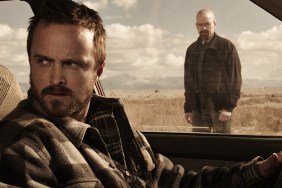Star Trek Beyond is due in theaters this Friday, and while the previous installment in the long-running film series may not have been much to write home about, the coming of a new Star Trek movie is, in the current environment, something exciting. The world kind of needs Star Trek right now. As times have become increasingly turbulent, and free-floating outrage has become the default emotion of most Americans, it’s important to remember what Star Trek has to offer in terms of optimism and promise. We live in a world where war is still common, demagogues run for president, and we have collectively lost track of how many public shootings there have been just this year. Star Trek, in the best of circumstances, offers a bold, almost defiant counter-vision to the horrors we live through.
When Gene Roddenberry was first pitching Star Trek to studio executives back in the mid-1960s, he sold it as “Wagon Train to the stars” (alluding to the 1957 western TV series). It was a constant exploration into deep space, where adventure awaited the crew of his invented starship. But, having lived through 50 years of the show’s extended legacy, we can now see that Star Trek has blossomed in the cultural consciousness into something much more than a mere frontier picaresque. It provided a vision of the future that was free of cynicism and fear. Despite a few notable exceptions, this was not a show about conquest or Colonial conquest. Whether or not Roddenberry pitched his multicultural, post-war vision of the future to executives is unknown. But it was cleverly inserted nonetheless. A legacy was born.

Paramount
Of course, much ink has been spilled over the years touting the glories and egalitarian nature of the Star Trek universe. Entire books have been assembled examining the show’s philosophy, science, and peaceful politics. When Star Trek: The Next Generation came along in 1987, these ideas were only codified further, finally stating explicitly what the original series only implied by association. What I observe about Star Trek‘s optimism is hardly novel. But any message of optimism and hope bear repeating.
It’s the post-military notions from Star Trek, however, that have always been the most appealing. Although the Enterprise was structured like a military vessel – complete with naval rankings and a military sense of discipline – one always got the notion that it was not a warship. The Enterprise was not built to “kick ass.” It was not meant to be “strong.” It was meant to be lived upon. It was a tool of study. In the original series, it could come across as unpolished, perhaps – it felt a lot like a submarine, back in 1966 – but it was never one to go in with guns blazing. Despite the popular misconception of Capt. Kirk being a guns-out cowboy, Starfleet officers were instructed to never shoot first.

Paramount
In recent years, one can get the impression that the world has become more and more aggressive. Fights break out online every second, usually over the most trivial crap. People take guns out in public with alarming frequency. Just when society thought it was moving towards a world of post-racism and post-sexism, horrid and ubiquitous hate speech began to rear its ugly head. And war is everywhere. It’s in the world, yes, but it’s also very much a part of the modern rhetoric. Strength is still seen as a matter of aggressive might, and it’s only one bad day that seems to stand between the ordinary citizen and a violent public row. We may not all be capable of swinging a fist, but we’re all certainly enraged.
Heck, even our biggest blockbuster entertainments are frequently about war. The series of Avengers films, for instance, have taken long-established comic book characters and emphasized that they are soldiers. Those movies are very much about how American military might created bad guys, and about how our violent retribution only creates more bad guys. It’s easy to see the parallels to America’s various wars in the Middle East. And while there is a slight tone of lamentation in those films, the heroes are still celebrated as, well, heroes. They still make their way onto lunchboxes. War and violence are still, at this late date, the surest and sturdiest symbols of strength, resolve, and heroism. No matter what destruction they do, the Avengers movies sell audiences on the notion that those things need to be done for the greater good. Also, so we can have a big effects-driven action showcase.

Paramount
Star Trek, for the most part, eschews war. When there finally was a war (in Star Trek: Deep Space Nine), it was a lamentable thing, not a glory. Star Trek, importantly, sells audiences on a new philosophy of strength. Strength through moral power, calm, a devotion to peace. In a way, the characters on Star Trek are often depicted as Shaolin monks. Trained in the ways of violence, but never itching to use it. They value innovation and intelligence. They are diplomats.
This may be why Star Trek is so often mocked by non-fans and outsiders, and why its fans had such a horrid social stigma for so many years. It wasn’t “cool,” because it didn’t “kick ass.” Its notions of power came from thought and inaction. There were no exciting displays of noise and hunting prowess. Many became fond of the central power dynamics of Star Wars. Star Wars has the word “war” in its very title, and each one of its exhilarating victories was, if ones pauses to think, about destruction and death. The Rebels and the Empire, you will find, have about equal casualties. Trek, meanwhile, preferred to remain quiet, calm, and relatively soft-spoken. It had found a new way, and only certain peaceful minds listened.
The notion of violence-as-strength is constantly threatening to tear the world asunder. Star Trek offers a new strength. A strength of the mind and of the spirit and of moral complexity. And in a world of anger and disquiet, that can only be our greatest asset.
Top Image: Paramount
Witney Seibold is a contributor to the CraveOnline Film Channel, and the co-host of The B-Movies Podcast and Canceled Too Soon. He also contributes to Legion of Leia and to Blumhouse. You can follow him on “The Twitter” at @WitneySeibold, where he is slowly losing his mind.







